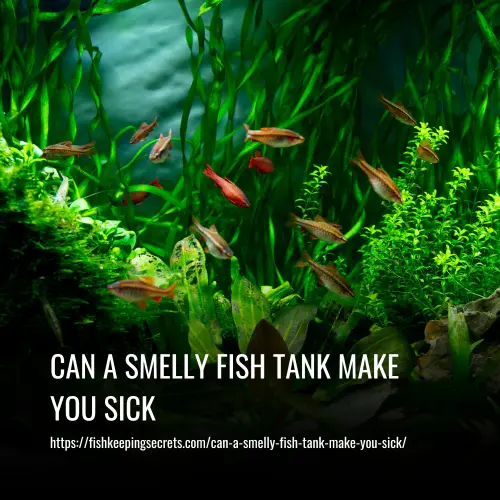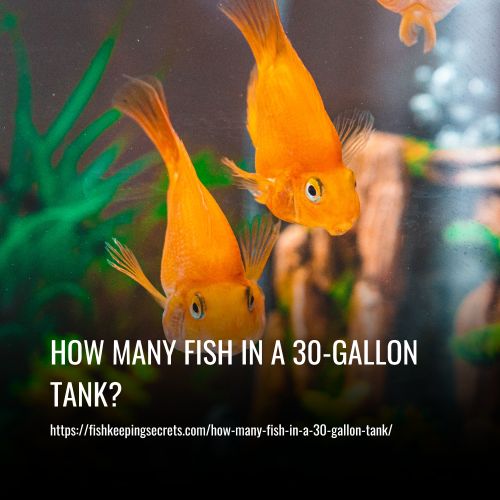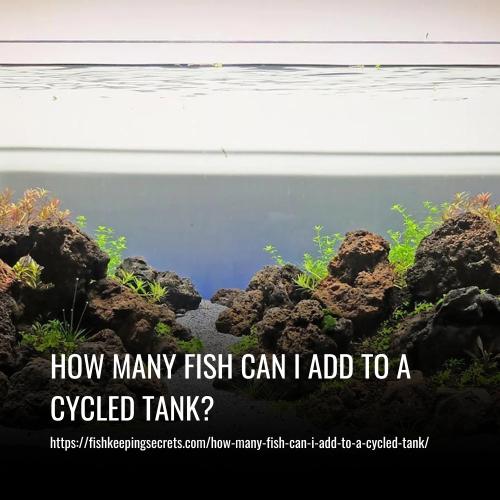Yes, a smelly fish tank can make you sick. The buildup of toxins like ammonia and nitrite in the tank can be harmful to humans. It’s important to properly care for and maintain your fish tank to ensure the health and well-being of both your fish and yourself. Neglecting a fish tank can lead to unpleasant odors and potential hazards. Keep your fish tank clean and well-maintained to prevent any negative health effects.

Causes Of Smelly Fish Tanks
To maintain a healthy and odor-free fish tank, it’s important to address the causes of smelly tanks. Here are some common culprits that can lead to unpleasant odors:
1. Overfeeding
Excess food can decompose in the tank, releasing chemicals and causing a foul odor. Ensure you are feeding your fish the appropriate amount and remove any uneaten food.
2. Overcrowding
Having too many fish in a tank can lead to an accumulation of waste, resulting in foul-smelling water. Make sure you have an appropriate number of fish for the tank size and consider upgrading to a larger tank if necessary.
3. Infrequent Cleaning
Neglecting regular cleaning and water changes can lead to a buildup of waste and bacteria, causing an unpleasant smell. Clean the tank and change the water regularly as recommended for your specific tank setup.
4. Dead or Decaying Fish
The presence of deceased or decaying fish can release toxins and cause strong odors. Remove any dead fish promptly to prevent this issue.
5. Improper Filtration
Inadequate or malfunctioning filtration systems can lead to poor water quality and odors. Ensure your tank has a properly functioning filtration system and clean or replace filters as needed.
6. Inadequate Aeration
Insufficient oxygen supply in the tank can create an environment conducive to bacterial growth, resulting in unpleasant smells. Use an appropriate air pump or other aeration methods to maintain optimal oxygen levels.
By addressing these causes and maintaining a clean and well-maintained tank, you can prevent smelly fish tanks and provide a healthy environment for your aquatic pets.
Harmful Chemicals Produced By Decomposing Fish Waste
When fish waste decomposes, it produces harmful chemicals that can negatively impact your health and the health of your fish. Some of these chemicals include ammonia, nitrate, nitrite, hydrogen sulfide, methane, and carbon dioxide.
Accumulation of these chemicals in the fish tank can create conditions that are detrimental to the well-being of your aquatic pets. It’s important to maintain proper tank hygiene and regularly clean and monitor the water parameters to prevent the build-up of these harmful substances.
Health Risks Associated With Smelly Fish Tanks
Having a smelly fish tank can pose significant health risks for both humans and fish. Here are the main health risks associated with a smelly fish tank:
1. Respiratory Infections
The contaminated air from a smelly fish tank can lead to respiratory infections. Breathing in harmful chemicals and toxins can weaken the immune system and cause symptoms such as wheezing, coughing, and shortness of breath.
2. Skin Infections
Improperly cleaned fish tanks can harbor bacteria and harmful microorganisms that can cause skin infections. Coming into contact with contaminated water can lead to rashes, itchiness, and sores on the skin.
3. Digestive Infections
Ingesting contaminated food or water from a smelly fish tank is a common cause of digestive infections. Fish waste, leftover food, and debris can promote the growth of harmful microorganisms in the water, leading to symptoms like vomiting, diarrhea, and nausea.
To mitigate these health risks, it’s crucial to regularly clean and maintain your fish tank. Ensuring proper filtration, water quality, and hygiene practices can help create a healthy environment for both you and your fish.
How To Fix A Fish Tank That Smells Bad
Removing bad smells from a fish tank can be a time-consuming process, but it is essential for maintaining a clean and healthy environment for your fish.
Supplies Needed
Below are all the supplies you need to fix a smelly fish tank.
- Aquarium gravel cleaner
- Large bucket
- Aquarium sponge or cleaning brush
- Water conditioner
- Fish net
- Activated carbon filter media
- Aquarium water test kit
Here is a step-by-step method for removing bad smells from your fish tank:
Step 1: Remove all decorations from the tank and clean them in a bucket of old tank water. Remove any dead plants or decaying fish with a net. Wipe down the tank glass to remove algae or debris.
Step 2: Vacuum the substrate using a gravel cleaner to remove excess food, waste, and dirt that has accumulated at the bottom of the tank. Pay attention to the corners as well.
Step 3: Turn off the aquarium filter and open it up. Clean the debris from inside the filter using old tank water. Rinse the filter media in the water by squeezing it a few times. Avoid using tap water as it can kill the beneficial bacteria in the filter media.
Step 4: Clean the inflow and outlet of the filter system to remove any sludge. Check that the impeller is not clogged.
Step 5: Reassemble the filter system and place it back in the tank. Perform a partial water change of about 25%.
Step 6: Fill a bucket with clean water treated with an aquarium water conditioner. Avoid using untreated tap water as it contains chlorine and chloramine which are toxic to fish.
Step 7: Add activated carbon filter media to your clean filter. Place it after the mechanical filter media.
Step 8: Use an aquarium test kit to check the water parameters and ensure that they are within the appropriate ranges. Ammonia and nitrite levels should be zero, while nitrate levels should not exceed 20ppm.
How To Prevent A Fish Tank From Smelling Bad
Preventing a fish tank from smelling bad is essential for maintaining a healthy and pleasant environment for your fish. Here are some preventative measures to consider:
1. Avoid Overfeeding
While it may be tempting to offer an abundance of food, it can have negative consequences. Too much food can cause bloating, digestive issues, and a fatty liver in fish. It can also lead to the growth of bacteria in the substrate, resulting in a foul smell. Only feed your fish the amount they can consume in two or three minutes and remove any leftover food with a net to keep your tank clean.
2. Avoid Overstocking
It is better to understock your tank than to overcrowd it. Use the “one inch of fish per gallon of water” rule to determine the appropriate number of fish for your tank, considering the adult size of the fish. Overstocked tanks have high bio-loads, which can lead to poor water quality, elevated ammonia levels, and unpleasant odors due to excessive fish waste. Maintaining water parameters becomes more challenging in overcrowded aquariums.
3. Removing Dead Fish
When a fish dies in your tank, it’s crucial to remove it promptly. A decaying fish can release harmful substances into the water, leading to foul odors, bacteria growth, and potential ammonia spikes. Regularly check your tank for any sick or deceased fish, including hard-to-reach areas like filters, decorations, and plants. Consider using a tank hood or cover to prevent jumping fish from escaping the aquarium. Prompt removal of dead fish will help maintain water quality and prevent further issues.
4. Trimming and Pruning Live Plants
Live plants add beauty to your aquarium, but they require maintenance to prevent decay and overgrowth. Rotten or overgrown plants can produce unpleasant odors and increase nitrate levels, risking the health of your aquatic life. Regularly inspect your plants and trim off any rotting leaves, which tend to be brown and slimy. Removing dead plants from your aquarium will maintain water quality and encourage new growth.
5. Frequent Water Changes
Regular water changes are essential to maintain stable water parameters and good water quality. Dirty water, foul odors, and fluctuations in water chemistry can all lead to stressed fish and increased risk of illness. Aim to do a partial (around 25%) water change once a week, using treated water to refill the tank. If your tank is overstocked or your fish produce a lot of waste, you may need to do water changes more often. Additionally, test the water parameters of your fish tank at least once a week using an aquarium water test kit to ensure optimal conditions for your fish.
6. Clean Your Fish Tank Substrate
The substrate in your tank can accumulate uneaten food, decaying plant matter, and fish feces, all of which can lead to the growth of anaerobic bacteria. This is particularly common in fine sand and gravel substrates, as they contain tiny pockets where debris can accumulate. Anaerobic bacteria can cause a foul smell and high ammonia levels in the tank, so it’s important to regularly vacuum the substrate using a gravel cleaner. This will help remove fish waste, leftover food, and plant matter, as well as prevent the formation of dead zones where harmful bacteria can thrive.
7. Regular Filter Maintenance
Cleaning your filter every three to four weeks helps keep your filtration system working properly and prevents bad smells. Use old tank water during maintenance to preserve beneficial bacteria. Avoid replacing filter media all at once as it can disrupt good bacteria colonies that remove waste.
8. Use Activated Carbon
Activated carbon is highly effective in removing bad fish tank smells by absorbing phenols and eliminating tannins, heavy metals, and chlorine. Purchase loose activated carbon or carbon filter cartridges from a pet store. Place the carbon in your filter, ideally after the mechanical filter media. Replace the activated carbon every two to four weeks to maintain its effectiveness.
9. Removing or Reducing Algae
To prevent algae blooms, avoid leaving your aquarium lights on for extended periods. Limit the number of nutrients in your water by feeding your fish sparingly and performing regular water changes. If your tank receives direct sunlight, consider relocating it to a darker area. You can manually remove algae with a scraper, sponge, or net. Algae removal products containing copper sulfate or cupric sulfate can also be effective in killing algae.
10. Testing Your Fish Tank Water
Regularly testing your aquarium water with a test kit is crucial to monitor the parameters and detect any issues. Ammonia levels rising in your tank may indicate a dead fish or rotten plant. Well-established aquariums should be tested every few days, while uncycled or newly cycled aquariums require daily testing due to their higher susceptibility to water chemistry fluctuations. By regularly testing your water, you can identify and address any problems to maintain a healthy environment for your fish.
FAQs
It’s recommended to clean your fish tank once every two weeks or at least once a month. This involves replacing 10-15% of the water and cleaning any waste or debris from the tank. Over-cleaning can disrupt the biological balance, while under-cleaning can lead to ammonia buildup and health issues for your fish.
No, household cleaners such as bleach or ammonia-based cleaners are toxic to fish and can harm them. Always use lukewarm water and a soft algae scrubber or a scraper to clean the tank. Vinegar can be used for tough spots, but rinse thoroughly before returning fish to the tank.
If your fish tank still smells bad even after cleaning it, there are a few things you can try. First, check for any waste or debris that may be caught under the tank lid or in the surrounding area. Clean any grime or remove any dead fish that you find. If the tank and hood are clean, try using activated carbon in your setup. Activated carbon is great for absorbing foul odors and can help freshen up your fish tank.
Keeping a fish tank in your house is generally safe as long as proper cleaning and precautions are taken. It can serve as a decorative element in your home and provide entertainment for both adults and children. Taking care of the tank and ensuring it is clean and fish-friendly can be a fulfilling hobby. Additionally, having a fish tank can be beneficial for individuals dealing with depression and anxiety, as watching the fish can provide comfort and amusement.
While it is possible to keep a fish tank in the bedroom, there are some factors to consider. The sound and smell of the tank may be unsettling and make it difficult to sleep. Additionally, the increased humidity from the tank can make the room feel stuffy and hot, which may interfere with sleep. It is important to maintain a humidity level between 30 and 50 percent for optimal sleep.
Yes, a fish tank can cause disease if it is not maintained properly. Poor water quality and an unhealthy diet can lead to bacterial infections in fish, which can then be transmitted to humans through regular contact with the fish or the tank. It is important to properly clean and maintain the tank to prevent the spread of diseases.
There are several diseases or infections that you can get from a fish tank. Some of the bacteria species responsible for these diseases include Streptococcus iniae, Mycobacterium, Campylobacter, Erysipelothrix, Aeromonas, Edwardsiella, Salmonella, Klebsiella, and Erysipelothrix. These bacteria can cause diseases such as aquarium granuloma, arthritis, Vibro infections, and Crayfish Handler’s Disease. It is important to take precautions when handling fish or being in contact with tank water to prevent these infections.
Fish tanks do not cause breathing problems. However, for individuals who already have breathing problems, such as asthma, being around fish tanks with tropical fish can potentially trigger respiratory issues. It is important for those with pre-existing respiratory conditions to be cautious around aquariums.
Yes, fish tanks can potentially cause allergies if not properly maintained. If the tank is not cleaned regularly and the water quality is poor, it can lead to the growth of mold, bacteria, and other allergens that can trigger allergic reactions in some people. It is important to properly clean and maintain the fish tank to prevent these issues.
To avoid smells in your fish tank, use treated tap water or distilled water. Tap water is fine, but make sure to dechlorinate it before adding it to the tank. Using the wrong type of water can lead to foul odors developing over time.
Using bottled water for aquariums can help prevent smells, but it’s not always necessary. If you’re having issues with water quality, then using bottled water can be beneficial. However, in most cases, tap water that has been properly treated is sufficient to prevent smells in an aquarium.
If you start to notice a stronger, unpleasant odor coming from the tank, it’s a sign that something is not right. Don’t ignore the smell and investigate the cause. It’s important to address any issues to maintain a clean and healthy tank environment for your fish or reptiles.
A healthy aquarium should have a mild earthy aroma. It shouldn’t smell fishy or pungent. To get a sense of this smell, you’ll need to get close to the water and take a sniff. It should be a light and pleasant scent, similar to freshly plowed earth.
Conclusion
In conclusion, it is important to recognize the potential health risks associated with a smelly fish tank. The presence of foul odors can indicate a build-up of harmful bacteria and toxins in the water, which can pose a threat to both the fish and the individuals caring for the tank. By addressing the root cause of the odor and maintaining a clean and healthy tank environment, the likelihood of illness or discomfort can be significantly reduced.
Regular maintenance, proper filtration, and routine water changes are key to preventing the accumulation of organic matter and pollutants that can lead to foul odors and potential health hazards. Keeping a close eye on the water quality and investing in quality fish tank care products can also help to ensure a safe and enjoyable environment for both the fish and their caretakers.



